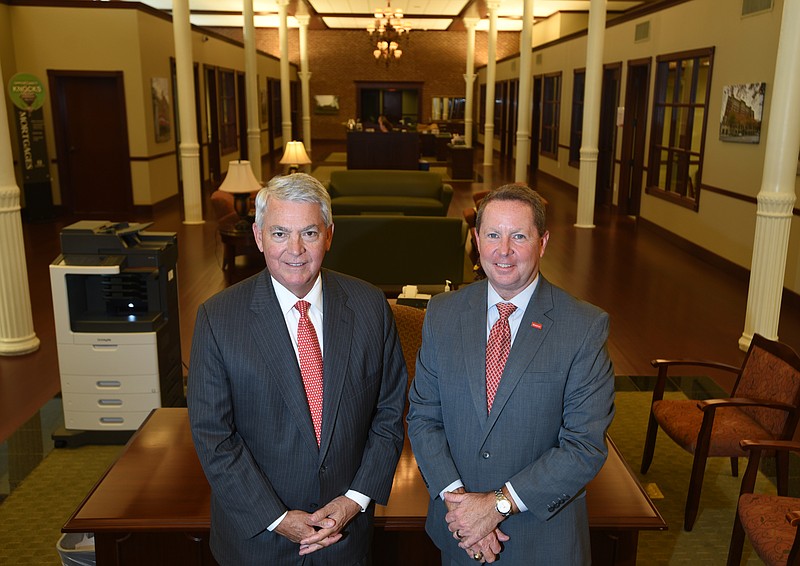When the Great Recession hit Georgia's economy eight years ago and stalled home sales and most new development, Synovus Financial Corp., was left with hundreds of delinquent commercial and real estate loans that ultimately cost the Columbus, Ga., banking company more than $3 billion in losses over the next three years.
By 2009, Synovus was named as one of the biggest of more than 150 U.S. lenders that had more than 5 percent of its holdings in nonperforming loans.
But aided by $968 million in loans from the Troubled Asset Relief Corp., a prolonged effort to work with delinquent borrowers to repay their borrowings and a staff and branch pruning to cut costs, Synovus has recovered from the financial crisis with both a stronger balance sheet and a stronger brand.
The banking giant operates 28 banks across five states, including Cohutta Banking Co. in Chattanooga. Although most of the local banks operate under their own name, the Synovus brand has emerged with what American Banker magazine said last month was one of the strongest brands in the industry.
In its annual survey of bank reputations, American Banker magazine and the Reputation Institute ranked Synovus No. 2 among the 33 banks included in the survey. Synovus was one of four banks in the top 10 among both customers and noncustomers and was featured on the cover of the July issue of American Banker.
Georgia Trend magazine also recently rated Synovus as one of the best places to work in Georgia.
Kessel Stelling, the chief executive and chairman of Synovus since 2010, has led the turnaround at Synovus. During a visit to Chattanooga Wednesday, he said the strong brand reflects Synovus' efforts to involve its staff in local business and civic programs, often with noncustomers of the bank.
"We don't tell our people what groups they should support, but we do expect our bankers and our leaders to be very involved in their community because we want to make the communities where we do business stronger by their social, political and civic involvement, regardless of whether the people we work with bank with us or not," he said. "I think our ranking in the Survey of Bank Reputations is further validation of our locally-focused, relationship-based business model."
Mike Sarvis, the president of Cohutta Banking Co. in Chattanooga, for instance, is chairman of the Chattanooga Area Chamber of Commerce.
Sarvis said in Chattanooga, Cohutta is working with professionals and small and medium-sized businesses and startups in a very customer-focused manner.
"We build strong relationships," said Sarvis, who oversees Cohutta's two local branches.
With more than $130 million in deposits, Cohutta Banking is the 11th biggest bank in metropolitan Chattanooga among the 28 banks that operate in the market.
"Chattanooga is a market where we see a lot of potential for growth," Stelling said. "There is a lot going on in Chattanooga right now and it seems to be more vibrant than when I last visited here."
Across the five states where Synovus operates, Stelling said the economy is showing growth and he expects loan volume to grow 5 to 7 percent this year despite some caution by many businesses in an uncertain political year.
Synovus grew across the South in the 1990s and early 2000s by buying up independent banks and allowing them to keep their charters, name and boards of directors. But the banks were ultimately consolidated as a single bank in the spring of 2010 and the Synovus banks are moving toward a common computer and processing platform by late 2017, Stelling said.
Synovus retains 28 bank names like Cohutta in different markets, which Stelling said "was a great differentiator and benefit during the financial crisis.
"No matter how bad the big banks were being hit, our local banks with their local customers were somewhat removed from that," he said.
Stelling said Synovus' patient and disciplined approach to working with customers with troubled loans, combined with the bank's own cost-cutting measures, helped Synovus repay its TARP loans by 2013 without having to issue a lot more stock that would have diluted shareholder value.
Synovus was forced during the recession to cut 850 jobs and prune its branch network. But the bank has restored profits and expects continued loan, deposit and income growth in 2016.
In 2014, the bank repurchased $250 million of stock and in October 2015 Synovus announced plans to repurchase another $300 million of stock. Moody's recently upgraded its assessment and bond rating for Synovus.
"We went from a company that was viewed as somewhat weak to a company that is viewed as strong and getting stronger," Kessell said. "We've returned over $500 million in capital to our shareholders and we're positioned to grow."
Contact Dave Flessner at dflessner@timesfreepress.com or at 423-757-6340.
